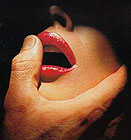|
|
|
|
Whispers
in the Dark
|
 |
|
Whispers in the Dark is, at first glance, a film (like The Temp, 1993) unfortunate enough to arrive at the dead end of the early '90s cycle of intimacy thrillers – movies that plunder the perils of close personal and professional relationships. Yet this erotic psychodrama, ingeniously written and directed by Christopher Crowe (Off Limits aka Saigon, 1988), plugs in to a slightly older line of post-feminist thrillers like Kathryn Bigelow's Blue Steel (1990), in which a heroine is confronted with the ambiguous manifestation of her most dangerous yet most longed-for dreams. There is a rich tradition in cinema of such Female Gothic. In fact, this story has a hallucinatory edge which takes one back even further to films noir about psychotherapy like Nightmare Alley (1947). It starts with some delightfully explicit lovemaking footage that turns out to be the wet dream of Dr Ann Hecker (Annabella Sciorra, fresh from the model intimacy thriller The Hand That Rocks the Cradle [1992]). She is unsettled enough by the kinky fantasies and confessions of several patients that she needs to work through her own emotional tremors with mentor Dr Green (Alan Alda, pleasingly cast against type). When her two key patients – a glamorous art dealer (Deborah Unger) and a crazy artist (John Leguizamo) – become part of a murder mystery in which her new lover (Jamey Sheridan) is also implicated, the collective psychoanalysis which ensues gets very complex. Father-figures, the lure of sadomasochism, and particularly the vexed question of trust in sexual relationships all play a key part. This fascinating movie went straight to video in Australia partly because (I suspect) a number of reviewers abroad derided it as implausible and over the top. This merely shows how critics who are fixated on plot credibility first and last so often miss out on what is really interesting and captivating in a film. Whispers in the Dark is a dreamlike fantasy: its sudden leaps, shifts and substitutions seek to mirror the knotted logic of the unconscious. I heartily recommend it. © Adrian Martin October 1993 |
![]()